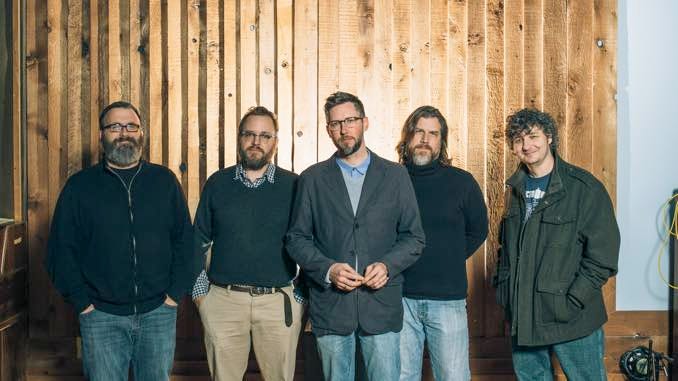Parallel Love: The Story of a Band Called Luxury
Four guys from a tiny college form a band pushing the edge of Christian music. Years later, three of them are now Orthodox priests -- and they're still making music, as told in this fascinating doc.
This review is part of our free offerings to subscribers and visitors. Please consider supporting Film Yap through a paid signup to our Substack, now at a huge discount!
The premise of “Parallel Love: The Story of a Band Called Luxury” seems almost like the setup for a mockumentary: four guys from a tiny Christian community college form a band, do some edgy music that builds a following, but they get pigeonholed as a Christian band and never really break out. Years later, three of them became Orthodox Christian priests — cossacks, cencers with incense, big beards, the whole deal.
And, they’re still making hard-edged music together — sort of The Smiths meets American punk, caterwauling guitars and thrumming drums underneath syrupy-sweet vocals.
Let’s face it, it sounds like a riff on “A Mighty Wind” or “This Is Spinal Tap.”
But it’s a real story about a real band, and as we get to meet the quartet of band members — plus another guy, who’s also the director — we find we’ve stumbled into one of the most peculiar and engaging music documentaries we’ve seen in awhile.
I’ve never heard of Luxury — I’m guessing you haven’t, either — which kicked off in the early 1990s after four guys stumbled together at Toccoa Falls College in rural Georgia. They were all Christians, but didn’t really want to do the “Christian band” thing at a time when that was becoming a viable option. Initially known as The Shroud, they played the usual Christian music circuits, got noticed and signed early on to a contract by Tooth & Nail Records, a faith-based label.
But nobody knew what to do with them. Guitarist Jamey Bozeman played flailing chords until his fingers bled, taped them up, and kept playing. Drummer Glenn Black seemed possessed or having a seizure as he slammed his kit with more violence than a WWE match. Bassist Chris Foley laid down mean riffs that pounded your head like a kettle.
And then, weirdly but amazingly, was frontman Lee Bozeman (brother of Jamey) singing like a disaffected emo teen, high soaring crescendos of pure tone that laid across this cacophony of sound like butter cream slathered over razor blades.
Bordering on punk, it didn’t sound like anything other Christian bands were doing, especially when you consider challenging lyrics that touched into forbidden areas like same-sex attraction, drug use and so on. Christian book stores wouldn’t stock their CDs, and they struggled to sell. The guys married, had kids, got other jobs, but would get back together for new albums and gigs.
And then, one by one, all but Black became Orthodox priests. If it sounds like a mutually exclusive thing to be a pastor and a punk rocker, apparently we’re wrong.
The fifth member of the band is Matt Hinton, aka “the other guitarist,” who was recruited after Lee felt restricted in his stage performance by having to play an instrument. He’s also the director of this documentary, an intimate collection of interviews with the Luxury members today with historical footage of them over the years.
Lee is purposefully the most mysterious, hiding behind the veil of the lead singer mystique as if animated by different impulses than normal humans. Scrawny with glasses and a huge high-and-tight ‘do, he nonetheless seethed charisma onstage, known for fixing his stare on a single member of the audience and not letting go.
Though married before the band got off the ground, Lee seemed to enjoy pushing boundaries and leaving people in doubt about his own sexuality. In his modern interviews, he still plays the audience, insisting that he never really thought much about what he was doing other than wanting to push the edge of music and faith.
There are also plenty of interviews with contemporaries and big Christian acts who viewed Luxury with awe, groups like Piltman Down and The Prayer Chain. They saw a band brave enough to eschew the Christian music rules, but also knew it would likely doom their chances for mainstream success.
It probably would have been best if Luxury had never signed with a Christian label and just put their music out to the mainstream, letting the subtle faith-based messaging be absorbed without necessarily being noticed.
Probably the high point of the doc is a concert at Cornerstone, a big annual Christian event, in which Luxury entranced the crowed with their bravura energy and unique style. Jamey played with such abandon that his guitar broke — not smashed against the stage, just seeming to come part in his hands. Lee seems fully in command of the audience, a concertmaster instructing his pupils.
There’s also the terrible car accident that severely injured three of the band members, leaving Lee with a crushed pelvis that took a year to heal and Black with a broken neck that contributed to seizures born of terrible childhood experiences, which he initially refuses to speak about. (But, be patient.)
It’s fascinating stuff, as people try to break out of the mold that has been set for them, continuing to run aground on the same expectations whose defiance made people fall in love with their music in the first place.
But director Hinton doesn’t leave it there, using the last portion of the doc to talk to the guys about how their journey led to the priesthood, what it’s like to lead hymns during the day and jam an amplifier to 11 at night, what their wives think about all this, and more.
Mainstream movies tend to do a terrible job of exploring religious faith in an authentic way, so it’s refreshing to hear people speaking with their heart on their sleeves about the role God plays in their lives. Foley in particular gives a memorable testimony about the role of the priest in lifting people up to embrace their creator and receiving comfort and healing in return.
I’ll admit I started watching “Parallel Love: The Story of a Band Called Luxury” with a smirk on my lips, expecting something snarky and twee. But there’s no mocking in this terrific documentary — just an honest portrait of some musicians who never made it, or at least not to the place people wanted them to go.





